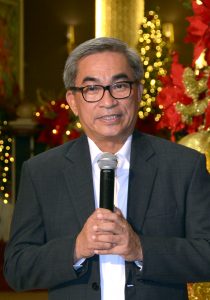
THE MINDANAO business sector has proposed for the identification of key areas in the island as sources of raw materials in modernizing agriculture for food security and the manufacture of key health equipment like personal protective equipment (PPEs).
In the economic component of the resolution read during the opening Thursday of the two-day Mindanao Business Council, the proposal initially identified the whole Central Mindanao region and the provinces of Bukidnon, Lanao del Norte, Zamboanga del Norte, Tawi-Tawi, and South Cotabato “in modernizing agriculture in order to address food security as well as the supply chain for the manufacture of PPEs.
Hosted by the Davao City Chamber of Commerce and Industry, the event was done online with Finance Secretary Carlos G. Dominguez III as its keynote speaker.
The same resolution, which was a product of discussions among the 42 chambers of commerce in Mindanao, also called on the Board of Investments and the local government units (LGUs) “to provide attractive incentives for companies investing in health care-related projects, including conversion of commercial spaces to quarantine facilities, construction of sanitary landfills and importation of special equipment for the safe and proper disposal of infectious and pathological wastes of hospitals and households.”
Other part of the resolution included the following;
— for the Bureau of Internal Revenue (BIR) and the Department of Labor and Employment (DOLE) to acknowledge the BMBE law by exempting micro enterprises capitalized below P3M from paying income tax and mandatory compliance of minimum wage adjustments;
— for Land Bank and DBP (Development Bank of the Philippines) to extend/re-structure the loan terms and maturity dates of loans extended to micro-finance institutions so that the latter can provide re-start/re-open credit assistance to micro enterprises mostly engaged in retail enterprises or services (vendors, repair services etc);
— for DILG (Department of Interior Local Government) to encourage LGUs to provide tax credits or discounts on Real Property Taxes (RPT) due from private companies who offer moratoriums on the payment of commercial rents and leases;
— and, for the institutionalization of the Kadiwa Express Food Logistics Program of the Department of Agriculture to promote farm to market linkages.
On tourism, the business sector proposed for the “bubble connectivity” which would identify safe markets where tourists can travel; for regional offices of the Tourism department to promote “weekend staycations,” and for LGUs to start their campaigns to focus on the bubble markets.
The business sector also endorsed other proposed intervention for the sector to ensure continuity, particularly on the part of the micro, small and medium enterprises and other industries.
Among these proposals are on the establishment of virus testing centers and similar laboratories in highly-urbanized areas in Mindanao, the granting of priority for testing of workers in the food supply chains, and the use of technology in contract tracing.
On infrastructure, the business sector pushed for the resumption of priority projects under the Build, Build, Program that have also been approved by the Regional Development Councils; the implementation of other key programs like shelter projects under the Marawi rehabilitation program, the electricity interconnection project between the Visayas and Mindanao; the rehabilitation of the Pulangi and Agus hydropower complexes; the Mindanao railway system, the expansion of the Laguindingan airport, the setting up of the Panguil Bay bridge, and the improvement of facilities of secondary airports of the island.
Other notable components of the resolution include those for structural reforms like the one calling on the DILG to “immediately provide all LGUs a standard and integrated electronic system in processing all local permits from construction, real property taxes and business permits, including the establishment of a database system using the community based information system thru Geographic information system.
Signing the resolution were Philippine Chamber of Commerce and Industry area vice president for Mindanao Maria Teresa R. Alegrio, and PCCI regional governors Arturo Milan for Southeastern Mindanao, Pete Marquez for Central Mindanao, Julie Senense for Eastern Mindanao, Roderico R. Bioco for Northern Mindanao, lawyer Paul Gudmalin for Western Mindanao, Loreta Sy for Southwestern Mindanao, Dr. Aldrin Ibbo for Bangsamoro Autonomous Region in Muslim Mindanao and Engr. Elpidio M. Paras, president of the Promote Normin Foundation.
